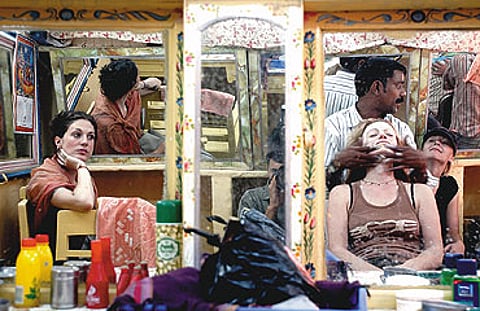It shows in the Ganesha T-shirts, in those single, white females riding pillion on the mobikes of the local dudes, the precocious, multi-lingual kids who can sell just about anything to anyone, and restaurants that go by names like Pink Floyd Cafe. There’s a strange bazaar mix of the ancient and the modern, the sacred and the profane. Besides the mantras, the most oft-heard chants are of trance music. Internet cafes still run on dial-up rather than on broadband. Nutella and Marmite flood the local stores. Rickety camel carts move around with AIDS awareness banners.
One hotel owner proudly tells us that 99 per cent of his guests are foreigners, another pegs them at 70 per cent. "Indian tourists fetch me just Rs 50,000 a year," he claims. The rest of his Rs 20 lakh per annum worth of white money comes from international wallets. So even the most modest of hotels flaunts a swimming pool in the backyard, offers camel safaris, reiki, reflexology and massages, and organises Indian cooking classes. The local barber gamely fixes sadhu-style dreadlocks for Rs 750-800. Deepak at the Rama Jewellery shop says "10 out of 10" of his customers are international tourists. It’s obviously to attract them that he displays a new "item", a metal beads bikini set available in "all sizes" for as little as Rs 1,200.
The first set of foreign tourists is reported to have come to Pushkar some time in 1968. The four tourists stayed at Birbal Baba’s Anand Ashram. Last year, the number went up to 43,980. There are two distinct kinds of tourists that populate Pushkar. All the year round, it’s the adda of the backpackers, mostly from Israel. At the time of the annual fair, the Israelis are pushed out because of escalating hotel tariffs to make way for the well-heeled tourists from Europe, Canada, Australia and America. But Israelis are a favourite with the locals, and have become adopted citizens. Our hotel owner claims that 85 per cent of his foreign guests are from Israel. The enterprising restaurants liberally display labane and falafel on the menu, Hebrew signage is on every other wall, and Hebrew letters are visible on the keyboards in Internet cafes. Third Eye, an Israeli cafe near Gau Ghat, claims to have sent food packets to Bikaner when Israeli soldiers came there visiting.
The FDI In Lord Brahma
An ancient desert fair with a foreign accent. Pushkar loses its innocence in the ethno-global marketplace.


It’s not difficult to understand why foreign tourists like Pushkar, despite the dictums of the priests. It’s cheap, safe and friendly. Israelis have other reasons to come calling. Says a hotel owner: "Christians don’t like Israelis, Muslim nations hate them. India is one place which welcomes them heartily." Also, they need a break after three years of compulsory army training. "They want to let go. We give them what they want," he adds, showing us telling pictures of the hash parties he clandestinely organises for them. "Hash is like mineral water here. It comes from Parvati Valley and is the best in the world. Just like we go wine-drinking in France, they ask for hash here," he claims.
Quirky characters abound. Like Om Baba, who plays the Australian didgeridoo gifted to him by a foreign friend. He refuses to speak in Hindi, behaves like a rapping ragamuffin rather than an Indian sadhu. In stark contrast is Jyoti, from Sicily, who has been living like a Gujar (shepherd) near Pushkar for the last 13 years. He refuses to talk in English, calls his Swedish wife lugai (the local word for wife) and teaches local traditions and customs to the tourists.
There are some outsiders who have made Pushkar their home. Pooja, a social worker from Tokyo, came to Pushkar because "God called". Mark Gopal is a French-Canadian who came to Pushkar 25 years ago and got married to a Telugu girl here. He runs the Shanooz ranch in Pushkar. For him, the town is sheer magic. "But things are going commercial, everyone is becoming greedy now, they are chasing big money," he says.
Meanwhile, the fair is throwing images of a split personality. On the one hand are the poor, devout villagers sleeping in the open in the cold nights, eating the Rs 10 lunch. On the other hand are the foreigners, living in frills-free tents that start from Rs 5,000 a night. As for the great Indian middle class—families like yours or mine—well, they are hardly there. The presence of a few Bengali and Gujarati pilgrims remains unadvertised. In the queer blend of the East and the West, it’s people like us who are left feeling like outsiders all along the 52 ghats of the Pushkar sarovar.
Tags